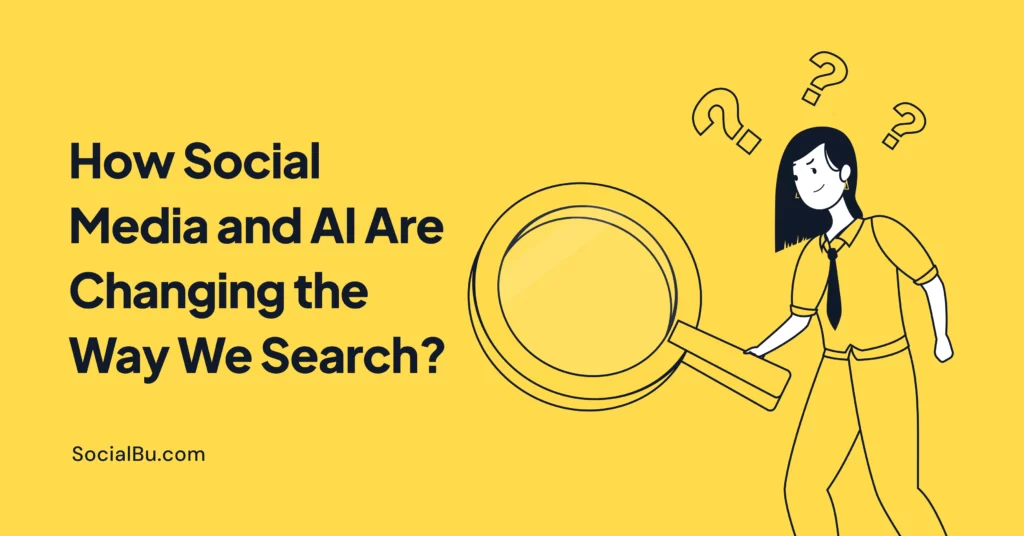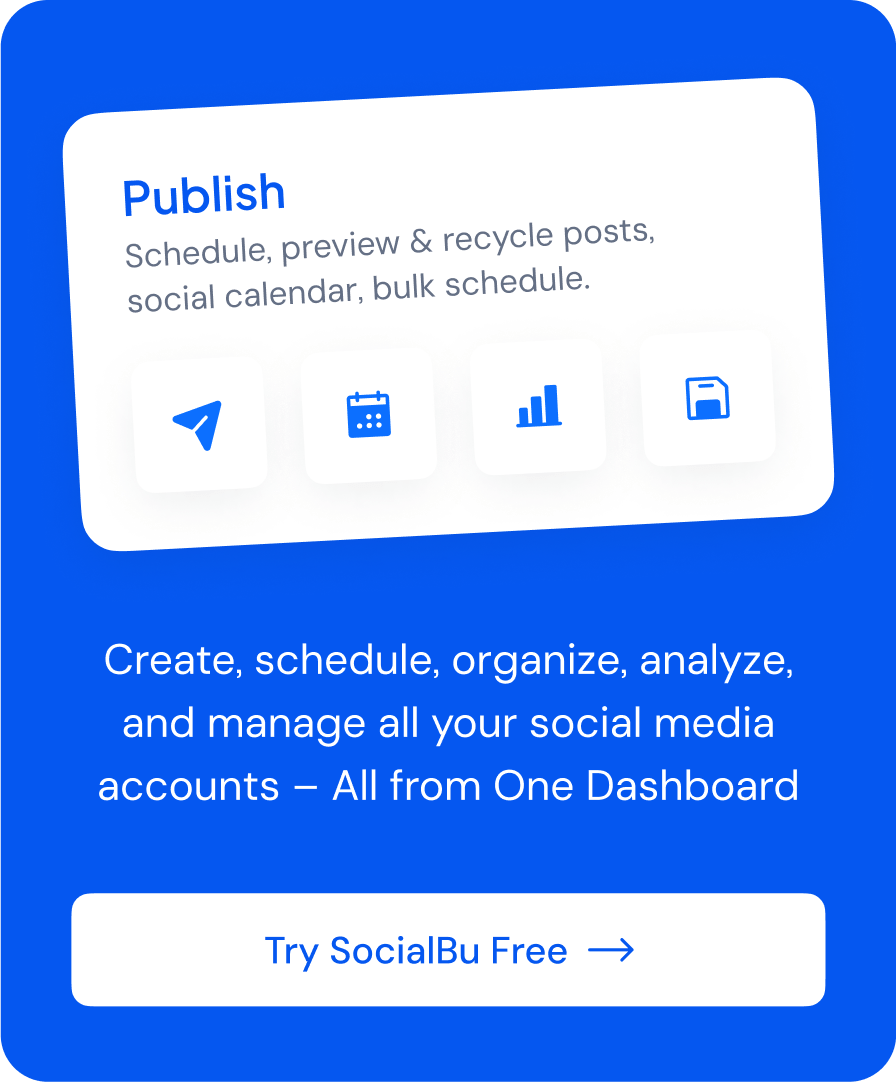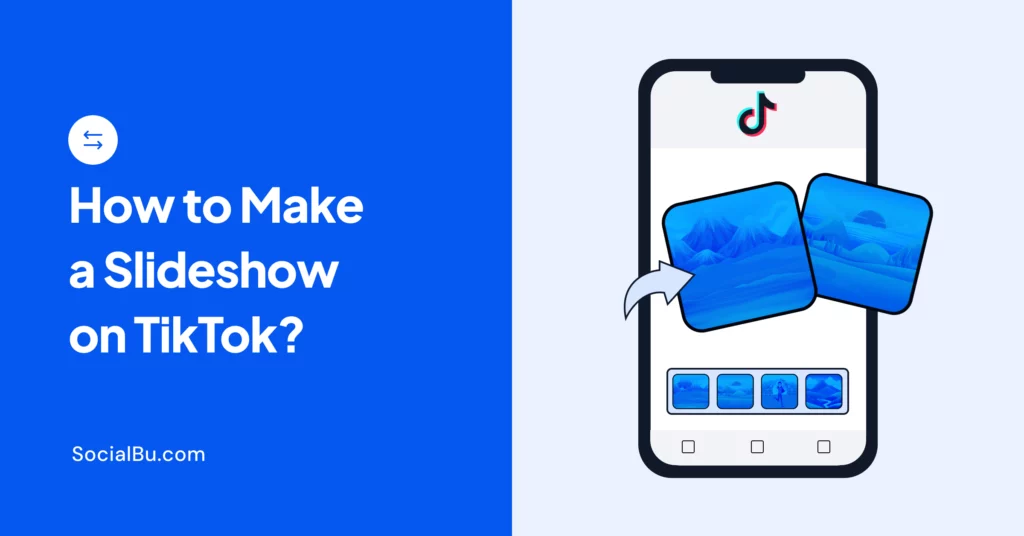Imagine this: You need a quick answer, but instead of heading to Google, you ask ChatGPT or find a trending post on TikTok. Does this sound familiar? Social media and AI are shaking up how we search for information, making it faster, more personalized, and even more entertaining.
From viral recommendations to AI-powered chatbots giving instant responses, how we discover content is evolving.
There’s a shift happening—one you might not notice right away, but it’s big. Gen Z and Millennials are changing how they find answers, whether for dinner spots or advice on fixing a squeaky chair.
So, what’s pulling them away from traditional search engines? And what’s holding people back from exploring this new way of searching? Keep reading to find out!
Why Social Media Is Taking Over Search?
Social media platforms were once places to connect with friends and share updates. Today, they have evolved into powerful search engines, reshaping how people find information online. Here’s why more users are turning to social media over traditional search engines:
Speed and Convenience
People crave instant answers, and social media delivers them quickly. Instead of scrolling through long articles, users can get bite-sized information through short-form videos, reels, and quick posts. Social media offers rapid access to content without the hassle of reading lengthy web pages, be it a new product review, a trending news update, or a tutorial.
Visual Learning
The rise of video-based platforms like TikTok, Instagram, and YouTube Shorts has changed how people consume information. Many users prefer watching a short video tutorial over reading a dense, text-heavy article. Visual content makes information easier to grasp and more engaging, whether learning a new recipe, mastering a DIY project, or understanding a complex topic.
Community-Driven Insights
Unlike traditional search engines that rely on algorithms and SEO-optimized content, social media thrives on real user experiences and personal recommendations.
People trust influencers, content creators, and everyday users who share honest feedback and firsthand experiences. This peer-driven approach helps users make informed decisions based on authentic reviews rather than generic search results.
As social media platforms continue to enhance their search functionalities, their role as information hubs will only grow stronger, making them a preferred choice for discovering news, trends, and everyday answers.
Google’s Grip Loosens for Younger Generations
The younger crowd has got a whole new way of doing things. Any dinner plans? TikTok it. Need a quick life hack? Instagram reels have you covered. It’s fast, visual, and authentic, precisely what they’re after.
Who’s Using Social Media As a Search Engine?
ExpressVPN statistics show that 66% of people aged 18–26 use social media platforms daily for answers. This makes sense. Bite-sized videos or posts are way more engaging than scrolling through blocks of text.
Even older Millennials (27–34) are catching on, with 60% turning to Instagram and Facebook for advice or recommendations. Even older demographics are turning to social media, with 62% of those aged 35–42 and 58% of those aged 43–58 using it regularly.
The older group might lean more toward Facebook than TikTok, but the trend is clear: people love community-driven advice.
Surprisingly, women seem to lean more toward this trend than men. About 63% of women use social media daily for searches, compared to 57% of men.
Students and workers also lead the way here—63% of students and over 60% of full-timers rely on platforms like Instagram and TikTok for their needs. Even the unemployed get in on the action, with half using social media for tips and opportunities.
The Role of AI in Changing Search Habits
As artificial intelligence advances, it dramatically reshapes how people search for information. AI-powered chatbots, virtual assistants, and search engines offer an alternative to traditional search methods, making information retrieval faster, more personalized, and more interactive.
AI Chatbots and Virtual Assistants: The New Search Experience
AI-powered chatbots and virtual assistants are revolutionizing the way users find answers online. Instead of manually combing through multiple search results, people can ask AI a direct question and instantly receive a well-structured, context-aware response. This shift is often supported by RAG (retrieval-augmented generation), which combines AI’s generative capabilities with access to up-to-date information for more accurate and relevant answers.
Popular AI tools such as ChatGPT, Google Bard, and Perplexity AI are leading this transformation by providing:
Conversational Responses
Unlike Google, which presents a list of links requiring further exploration, AI tools generate natural, human-like responses tailored to the query. This conversational approach allows users to get clear, detailed answers without needing to piece together information from multiple sources.
Personalized Assistance
AI-driven search engines continuously refine their responses based on past interactions. AI can deliver more relevant and customized answers by analyzing user preferences, behavior, and previous searches, making searches more intuitive.
Summarized Content
Instead of reading long-form articles or research papers, users can rely on AI to extract key insights and provide concise summaries. This primarily benefits students, professionals, and researchers who need quick takeaways without spending hours reading dense material.
How AI Personalizes Search?
Traditional search engines like Google rely heavily on SEO rankings, backlinks, and keyword density to determine search results. In contrast, AI-powered search tools go beyond simple keyword matching by analyzing user intent and context to generate highly relevant responses.
AI refines search results based on:
- User behavior – How users interact with AI, the type of questions they ask, and their preferences.
- Search context – AI understands whether the search is general, research-focused, or transactional and adjusts its responses accordingly.
- Previous queries – AI remembers past interactions, ensuring a more seamless and personalized search experience.
This deep level of personalization makes AI-driven search engines a compelling alternative to traditional search methods.
AI’s Role in Filtering Information
One of the most significant advantages of AI-powered search tools is their ability to filter out irrelevant or misleading information. Instead of sifting through multiple sources filled with ads and outdated content, users receive precise, well-structured answers within seconds.
This is particularly useful for:
- Research-heavy topics – AI can scan large volumes of data and summarize key findings.
- Technical troubleshooting – Instead of browsing multiple forums, AI provides step-by-step solutions.
- Legal or financial queries – AI can condense complex regulations or policies into easy-to-understand explanations.
However, AI has limitations. It can sometimes generate biased or inaccurate information, so users must cross-check facts with trusted sources to ensure accuracy.
The Flip Side: Hidden Challenges of Social Media Search
Why do some people stick with Google if social media is so great? Honestly, it’s because these platforms come with baggage.
Ads Everywhere, All the Time
Have you ever tried searching for something on TikTok or Instagram only to be bombarded with ads? Annoying, right? About 41% of users say the constant interruptions make searching frustrating. When looking for a simple recipe, the last thing you want is to scroll through endless promotions.
Can You Trust It?
Social media thrives on user-generated content—but how accurate is it? 38% of people feel uneasy trusting what they find online. That viral life hack might be genius… or complete nonsense. Unlike search engines, there’s no built-in fact-checking, meaning misinformation can spread quickly.
Bias: A Blessing and a Curse
Social media gives you content tailored to your interests, which sounds great—until it’s not. Around 32% of users don’t like how biased or opinionated the content can be. Is that glowing review legit, or is it just a paid promotion? It’s not always easy to tell.
Need Specific Info? Good Luck.
Social media is great for quick answers, but finding detailed, niche information isn’t easy. About 29% of users have difficulty getting technical or in-depth answers. Google is still your best bet if you’re searching for something particular.
The Misinformation Problem
Let’s be honest—false information spreads like wildfire online. A staggering 75% of users say they’ve encountered misleading or outright false content, and 20% see it regularly. That’s a lot. Some users navigate this well—25% say misinformation isn’t a big issue for them—but it’s a growing concern for most.
Privacy Concerns: A Dealbreaker for Some
Platforms like TikTok and Instagram aren’t precisely known for privacy. Many users prefer Google simply because it feels more transparent. About 37% of people aged 43–58 and 34% aged 59–65 trust Google more because they believe it’s upfront about data usage. Even 25% of Gen Z agrees.
AI search tools like ChatGPT are also gaining trust. Twenty percent of Gen Z and sixteen percent of Millennials (ages 27–34) prefer AI because it offers a more private search experience. Unlike social media, it doesn’t involve broadcasting your questions to an entire network.
Google vs. Social Media vs. AI: Which One Wins?
Each platform has strengths, and users may combine all three for different types of searches. Here’s a little overview of all three platforms to compare and determine which one to rely on for what aspect of your search.
TABLE
The Future of Search: A Hybrid Approach?
The future of search is unlikely to be dominated by a single platform. Instead, users may combine AI, social media, and Google depending on their needs:
Quick & fun searches → Social media
In-depth research → Google
Instant personalized answers → AI chatbots
Tech giants like Google are integrating AI into their search experience to compete with these emerging trends.
Bottom Line
Search is no longer just about typing into a search box— it’s a dynamic, interactive experience. Social media and AI are reshaping how we find information, offering new ways to explore content while presenting new challenges.
The key to choosing a search method is balancing trust, speed, and accuracy. Staying ahead means embracing the right tools as search habits continue to shift.
If you want to streamline your social media presence and make the most of these trends, SocialBu can help you automate, schedule, and manage your content effortlessly. Try it today and keep up with the future of search!







